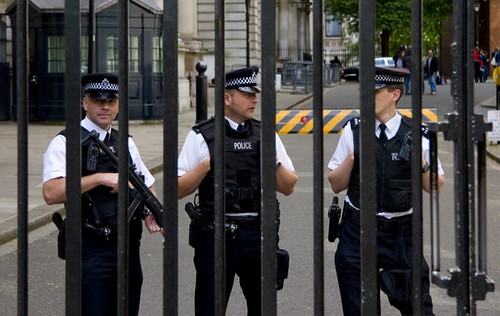Prime Minister Boris Johnson used his overwhelming Parliamentary majority to push through controversial legislation that would allow police to curb the right of protest and could endanger freedom of expression – despite widespread opposition and criticism.
The Police, Sentencing and Courts Bill would amend the Public Order Act of 1986 on the regulation of protest marches and is being scrutinized in the House of Lords before it’s sent back to Parliament. It passed the House of Commons with no significant amendments even after a wide range of public opposition even from senior police officials and his own party.
AEJ UK Secretary Charles Jenkins wrote that the new laws were a “severe challenge to peaceful freedom of protest long regarded as one of the fundamental rights of British citizens and indeed of those of all properly democratic countries” and noted the legislation “looks more like the rule book of an authoritarian regime than a democracy”.
– More than 700 legal scholars sent an open letter urging the Prime Minister Boris Johnson to ditch the “draconian” restrictions.
– more than 245 charities, community groups and campaigners joined a campaign by human rights group Liberty and environmental group Friends of the Earth to stop the legislation.
– Prominent members of Johnson’s own Conservative party raised serious concerns – former Prime Minister Theresa May, former attorney general Dominic Grieve, and joining with him in a joint letter even pro Brexit and Covid lockdown opponent Steve Baker.
– Even senior police and crime commissioners across England and Wales said the proposed law went too far.
The government’s police bill has the potential for long lasting restrictions to public protest.
Perhaps illustrative of the complexities of its implementation – people’s rights, public order, public safety, political agendas – was the government’s own role in controversial police handling of a vigil on March 13 2021 for Sarah Everard, abducted, raped and murdered after walking through a park in Clapham south London. Late in the vigil police forcibly arrested several people in an intervention many said was misjudged.
It appeared from a memo leaked to The Guardian newspaper that the government supported and encouraged the police action even though it later criticized it in the wake of criticism.
A Metropolitan Police officer, Wayne Couzens, later pleaded guilty to the rape and murder.
Police bill passes Commons
Police bill proposed
An authoritarian rule book?
The bill
Legal scholars protest
Community and human rights group campaign
Former Conservative prime minister Theresa May warning
Conservatives Steve Baker and Dominic Grieve joint warning
Police and crime commissioners
Police manhandle vigil
Sara Everard vigil
Questionable police tactics
Leaked government memo
Police officer pleads guilty to rape and murder








